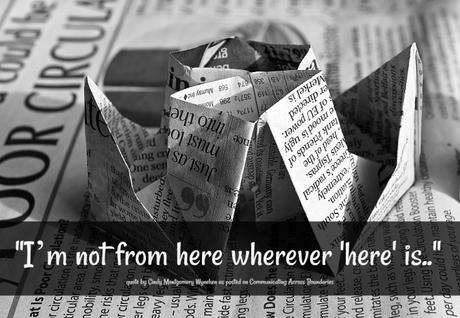
I'm from the edges of the map
the edges of the Pacific
I'm from the edges of the room
the outside looking in
I'm from Southeast Asia
unless you mean my nationality
I'm from the U.S.
unless you mean where my heart is
I'm not from here
wherever "here" is
A few months ago. I was with a group of global nomads and the "I'm From" poem exercise came up as an activity to do with students, third culture kids, immigrants, refugees, expats and all those who live between. We talked about using words to explore the complexity of our journey. These "I'm From" poems become mini memoirs telling a part of our story that otherwise remains hidden.
When I first arrived in the United States as a college student, holidays were the times when I struggled the most. The "Who am I?" and "Where am I from?" questions became much more acute. I'm not in the same place anymore, but I remember well what it was to be in that space.
If you are around third culture kids, global nomads, or cross-cultural kids during this holiday season, it may be good to be aware that this is not an easy season for those struggling with identity. The families and communities that we create when we are away from our passport countries are close and unique, borne of mutual need and shared understanding. Our extended biological families do not always have the same intense connections. Auntie Anne may be wonderful and warm, but may not have much understanding of where the third culture kid is coming from both physically and ideologically.
These "I'm From" poems are a window into the world of those who may look like you on the outside, but have had a vastly different life experience because of where they were raised. These poems express in writing what can be so hard to articulate verbally.
If you are one who opens your home to these kids and adults, Taylor Murray at the blog A Life Overseas has some suggestions of questions to ask that may help you communicate and connect. She divides the questions into "Church-Lobby Questions" and "Coffee Shop Questions". Taylor says this about connecting with third culture kids:
Most MKs/TCKs are asked hundreds of questions during their families' home assignments. Ironically, many of us leave our passport countries feeling unknown. In all honesty, we usually don't answer questions well. Our fumbling answers can create distance. Many times we feel as though these questions are asked politely, without time or desire to listen to our answers. In order to avoid awkwardness or unintentional hurt, TCKs can detach and dispel memorized responses. This makes it difficult for those who truly want to connect. Have you ever longed to know a TCK, but don't know how to reach his or her heart? Have you sensed that we struggle to respond to your questions, but don't know what else to ask? As an MK/TCK, I've learned that certain questions can unlock the heart.**These questions can be a way to bridge gaps of understanding and help connect the third culture kid to others in the room.
I have my own favorite questions adapted from Taylor's piece:
- What is one of the funniest things that happened to you in your host country?
- Where do you feel most at home?
- What are some impressions that people from your host country have of your passport country?
- Can you tell me a bit about the political situation in your host country?
- What have some of the biggest surprises been about living in your passport country? Challenges?
- What are some of the things you had to leave behind?
*Recently, the "I'm From" poem that Adelaide Bliss wrote three years ago resurfaced on the blog. A new reader found it and, inspired, wrote her own "I'm From" poem.
**I have changed Taylor's response to include TCK, not just MK (Missionary Kid).

